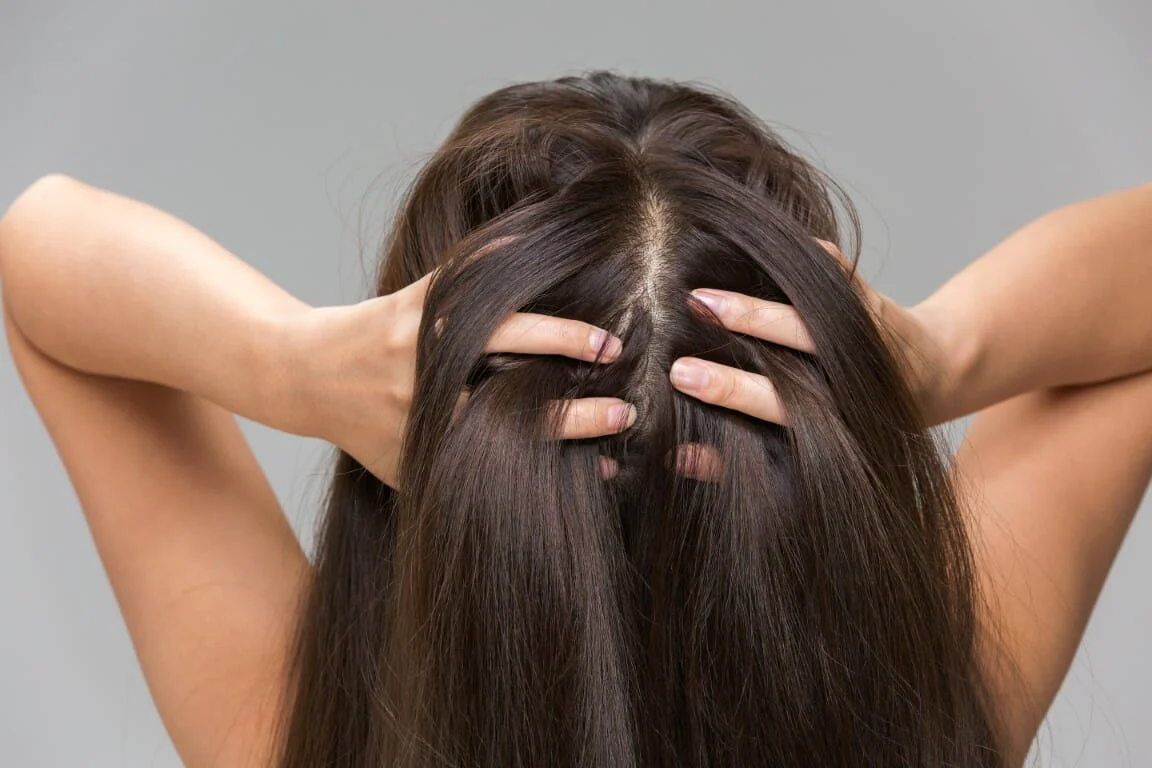Reactive hair loss, often induced by stress or other emotional and physical factors, represents a major hair challenge. Fatigue? Postpartum? Loss of a loved one? The reasons are more numerous and this phenomenon considerably impacts the scalp, causing noticeable and often stressful hair loss for those who suffer from it.

By talking to pharmacists to understand the mechanism of hair loss, we learn that certain treatments can have a beneficial effect in the long term, pointing to effective solutions for situations where hair loss seems endless.
This article is intended as a basis: it discusses the causes, symptoms and effective ways to deal with them and promote hair regrowth.

Mechanisms of reactive hair loss: impact of stress on hair health

Reactive hair loss, also called telogen effluvium, is characterized by excessive and sudden hair loss. The normal life cycle of the hair is disrupted, mainly by stress, causing many hairs to go into a resting phase and then fall out. This type of hair loss can also occur after pregnancy, due to emotional shock, fatigue, or seasonal changes. This is called reactive hair loss.

Identifying Reactive Hair Loss: Signs and Symptoms

Signs of this hair loss include a significant increase in hair loss when brushing or washing, a decrease in density across the entire scalp without distinct bald patches. If hair loss persists, it becomes crucial to consult a professional for proper management.

Triggers of reactive hair loss: analysis and prevention

The main causes of reactive hair loss range from psychological stress to nutritional imbalances. Maintaining a balanced diet, managing stress, and avoiding harsh hair treatments are effective ways to prevent this phenomenon. Specific nutritional supplements may also be recommended to support scalp health and hair strength.

Evolution and personal impact of reactive hair loss

Reactive hair loss, often related to stress or other emotional factors, can result in significant and sudden hair loss, profoundly affecting an individual's self-esteem. This phenomenon, although usually temporary, can leave those who suffer from it feeling vulnerable and lacking in control over their appearance.


Emotional and social impact
Hair loss can be particularly distressing because it changes the way you feel about yourself and how others perceive you. For many, hair is associated with vitality and health, and seeing your hair thinning can cause anxiety and a loss of self-confidence. Unfortunately, this added stress can make the situation worse, creating a cycle that is difficult to break.

Evolution of the condition
Typically, reactive hair loss begins suddenly and can quickly become severe. Fortunately, with early identification, it is possible to minimize the impact and encourage healthy hair regrowth. Those affected often see improvement within three to six months of changing their lifestyle habits or starting treatment.


Effective Strategies Against Stress-Related Reactive Hair Loss
Specific hair range

Use sulfate- and silicone-free shampoos and conditioners that are gentle on the scalp and won’t strip hair of its natural oils. Products enriched with nutrients like biotin, zinc, and B vitamins can help strengthen hair and stimulate new growth.

Stress reduction therapies
Incorporating stress-reducing activities like yoga, meditation, or exercise therapy can help lower overall stress levels and, in turn, reduce the impact on hair health. Effective stress management is key to breaking the cycle of reactive hair loss. So, stay fit!

Nutritional supplements
Consider adding supplements if your diet is lacking certain essential nutrients. Omega-3 fatty acids, iron, vitamin D, and protein are especially important for maintaining healthy hair.
Suffering from reactive hair loss? Integrate our food supplements that strengthen each hair from its growth phase. No compromise between nature and effectiveness with Reactive Hair Loss.
Scalp Massage Routine
Regular scalp massages can improve blood circulation, promoting better nutrition of the hair follicles and stimulating hair growth. Use essential oils such as peppermint or rosemary to improve the effectiveness of massages. A beneficial action against hair loss.


Male pattern baldness and reactive hair loss: causes and solutions
Although often associated with women, reactive hair loss also affects men. Male pattern baldness, or androgenetic alopecia, is mainly caused by genetic and hormonal factors. Dihydrotestosterone (DHT), a derivative of testosterone, plays a key role by gradually reducing the growth phase of hair, leading to miniaturization and eventual baldness.

At the same time, reactive hair loss can occur as a result of intense stress, emotional shock, malnutrition, or illness. Unlike baldness, reactive hair loss usually affects the entire scalp evenly and is often temporary.

Prevention strategies and solutions
Optimizing Scalp Health: A healthy scalp is crucial to preventing hair loss. Regular use of shampoos and masks formulated to stimulate blood circulation and nourish the roots can help maintain a healthy environment for hair growth.


Medical treatments: For male pattern baldness, treatments such as finasteride , which blocks the formation of DHT, or minoxidil , which can stimulate hair growth, are often recommended by dermatologists. These treatments usually require a prescription and should be used under medical supervision.

Supplements and Diet: Eating a good diet rich in essential vitamins and minerals can support hair health. Supplements such as biotin, zinc, and iron may be beneficial, especially if hair loss is related to a nutritional deficiency.


Stress Management: Since stress is a major trigger for reactive hair loss, finding effective strategies to manage daily stress can reduce the frequency and severity of hair loss episodes. Relaxation techniques, regular exercise, and adequate sleep are essential.

Surgical Procedures: In cases of advanced baldness, options like hair transplant may be considered. These procedures, although expensive, offer permanent and natural solutions to hair loss.


Care of Straightened Hair in the Context of Reactive Hair Loss: Tips and Tricks
Chemically treated hair is more susceptible to damage and hair loss. Incorporating gentle products into your hair care routine and avoiding additional chemical treatments. Another tip is to apply nourishing masks regularly to reduce the risks.

Intensive hydration
Relaxed hair quickly loses its natural moisture. Regularly use deep moisturizing products, such as hair masks or natural oils (coconut oil, argan oil) to maintain moisture in your hair and scalp. Resolution #6 , our best-selling 3-in-1 is ideal for nourishing and moisturizing hair, while strengthening it!
Reduce handling
Avoid excessive manipulation of your hair. Hairstyles that pull or stress the scalp can exacerbate hair loss. Opt for gentle, protective styles that don't pull on the roots.
Gentle care
Opt for gentle sulfate-free shampoos, such as our fortifying and anti-hair loss shampoo , and conditioners that strengthen hair without weighing it down. Avoid products containing dry alcohols that can dehydrate relaxed hair. At the end of this healthy use of care, the highlight is to combat the origins of the cause.
Adequate nutrition
Make sure to incorporate essential nutrients that promote healthy hair into your diet. Vitamins A, C, E, minerals like zinc and iron, and protein support hair growth and resilience.
Relaxation techniques
Engage in stress-reducing activities such as yoga, meditation, or light exercise to help manage daily stress, a contributing factor to reactive hair loss.


Professional consultation
If your hair loss is severe, consult a dermatologist or trichologist. These specialists can offer specific treatments and advice tailored to the condition of your relaxed hair and your personal needs.

Conclusion
Understanding reactive hair loss in depth is essential to effectively managing its effects. This understanding begins with identifying potential triggers (such as stress, hormonal imbalances, or nutritional deficiencies) that can exacerbate the condition. By adopting preventative strategies such as stress management, eating a balanced diet rich in essential nutrients, and using appropriate hair care products, you can help minimize the impact of hair loss and encourage healthy regrowth.

It is also crucial to incorporate specific treatments, whether topical or oral, under the guidance of a healthcare professional. If you notice unusual or concerning hair loss, it is imperative to consult a dermatologist or trichologist for an evaluation and personalized management, to ensure that the care provided is well-tailored to your specific needs. Hair loss can intensify with the change of seasons; careful use of your brush can minimize shedding and reduce the consequences of this natural reaction.

By taking these steps, it is possible to restore not only the health of your scalp and hair, but also to strengthen your overall well-being.
In this season when hair loss intensifies, visit your pharmacy to add to your basket essential products for hair growth and strengthening, meeting all your care needs. We hope to have brought you real help with your problem!

FAQ
How do you know if hair loss is due to stress?
Stress-induced hair loss, also known as telogen effluvium, can present as sudden diffuse shedding a few months after a stressful event. Signs to look out for include a noticeable increase in the amount of hair shed when brushing or washing, as well as a general thinning of the hair without distinct bald patches.
Can emotional shock cause hair loss?
Yes, emotional shock can trigger reactive hair loss. This is because stress can disrupt the normal hair growth cycle, pushing a large number of hairs into the resting phase, which then results in noticeable hair loss a few months after the stressful event.
How do you know if hair loss is abnormal?
Hair loss is considered abnormal if you lose more than 100 hairs per day consistently over a prolonged period of time. Other signs include visibly thinning hair, thinning areas, or bald patches that suddenly develop. If you notice such symptoms, it is advisable to consult a specialist.
Why am I losing a lot of hair all at once?
Sudden hair loss can be attributed to several factors including stress, hormonal imbalances, nutritional deficiencies, or reactions to certain medications. Identifying the underlying cause with the help of a professional can help treat the condition effectively.


